- God Is Dead: Long Live the Gods (new in 2020)
- Fault Lines
- Beyond the Burning Times
- Persuasion, Power, & Polity
- Pagans & Christians
A Case for Polytheism
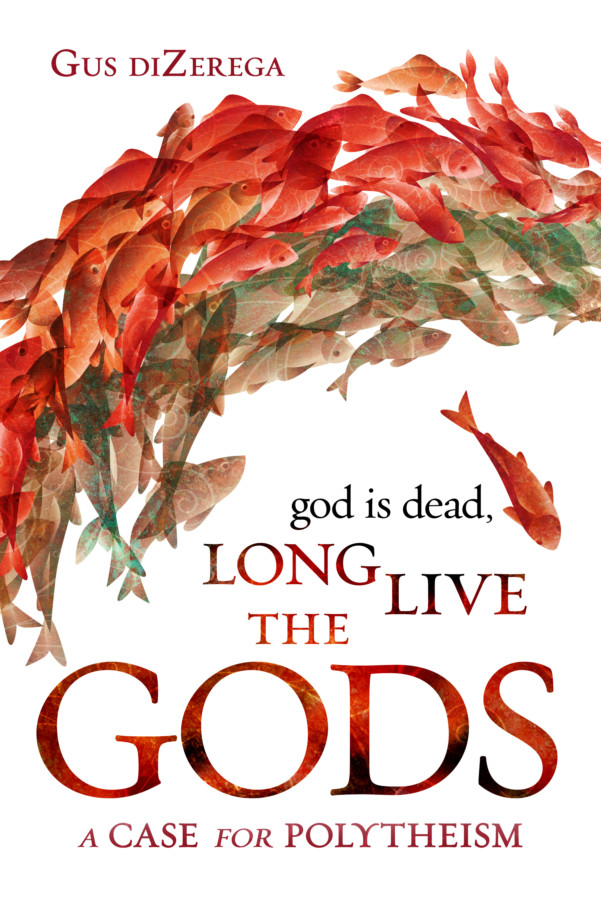
Powerful New Perspectives on the Integration of Science and Spirit… Examining the relationship between polytheism and quantum physics, biology, and ecology can open new vistas of sacred discovery. God Is Dead, Long Live the Gods develops a bold new vision for polytheism’s evolving role in our society and in our individual and collective spiritual experiences.
Join author Gus diZerega as he explores contemporary science to show why consciousness is a fundamental aspect of reality and why polytheistic experiences are as varied as the vast array of living organisms that enrich our world. This book shows why monotheism is actually a form of polytheism, and it explores fascinating spiritual concepts such as thought forms, mystical experiences, shamanism, spiritual healing, and universal love. Whether you’re interested in the mind-bending implications of emergence theory or want to know if the universe is alive, you will discover transformative answers and a new integration of science and spirituality.
“With its direct and fierce opening, this book develops beautifully, it is clear and challenging thinking essential in today’s world.”
Emma Restall-Orr, author of The Wakeful World, Spirits of the Sacred Grove, and Kissing the Hag.
“diZerega is among the most progressive and thoughtful writers in his field. The main idea in this book, that polytheism is the normal human spiritual experience and that even monotheism is an aspect of the polytheist experience, is far more radical than it may appear at first glance. He has the remarkable ability to explain difficult concepts with clarity, and to apply his analytic skills in ways that show respect to the people whose feelings he examines. The way forward, for the pagan community, is with books like this one.”
Brendan Myers, professor of philosophy, author of Reclaiming Civilization and Circles of Meaning, Labyrinths of Fear.
1,500 years of monotheist hegemony has obscured polytheism’s meaning and significance. As a result, contemporary polytheists still struggle with conceptualizing and articulating their experience and with recovering the legacy of polytheist civilizations from monotheist appropriation and distortion in order to answer the call, deep in our being, to engagement with the living immortals. DiZerega’s book offers insight into the historical conditions of the emergence and crisis of monotheist hegemony, a critique of its fundamental preconceptions, and a readiness to take up the burden of thinking new structures adequate to ancient and contemporary polytheisms in the context of today’s scientific-technological worldview. DiZerega’s compelling personal narrative, as well as his open and evolving theoretical perspective, testifies to the growing intellectual maturity of the polytheist movement.
Edward Butler, Ph.D.
Dr. diZerega explores polytheism and monotheism from every conceivable perspective and discipline — from Nature and science, from theology, history, and personal experience — to show that gods, spirits, otherworldly entities are alive and well in today’s world, as they always have been. A true opus magnum.
M. Macha NightMare (Aline O’Brien)
Witch at Large, Author, Activist, Ritualist
Fault Lines
The Sixties, the Culture War, and the Return of the Divine Feminine
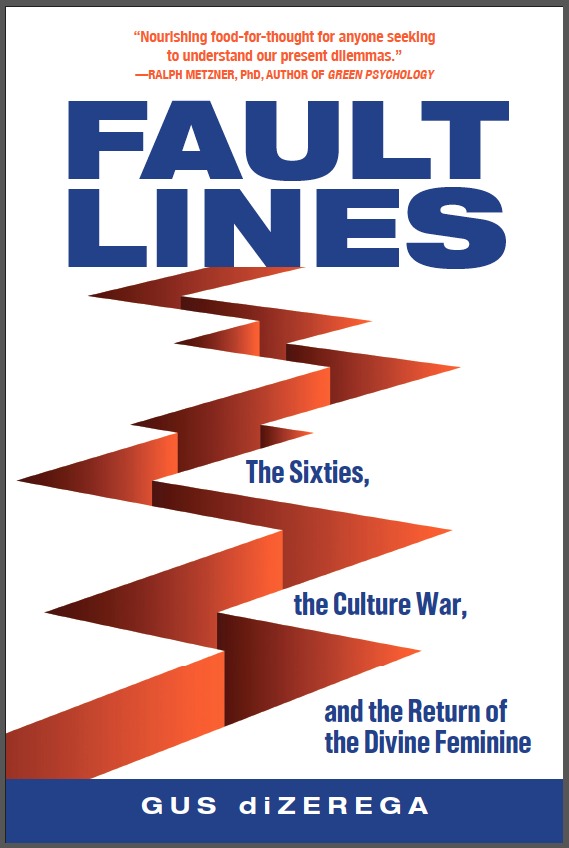
The United States is suffering its greatest upheaval since the Civil War—politically, economically, socially and religiously. In Fault Lines: The Sixties, the Culture War, and the Return of the Divine Feminine, author Gus diZerega explores the complex causes leading us to this point, comparing them to giant fault lines that, when they erupt, create enormous disturbance an in time new landscapes.
In 1960 the American political landscape seemed as peaceful as California’s hills, valleys, and bays. Since then the country’s deepest fractures have begun to shift. Our land has entered upon a time of growing upheaval in every dimension of our common life. Fault Lines argues three basic faults are causing this disruption.
With great clarity and vision, diZerega traces the disruption first to America’s first countercultural movement originating in the antebellum South and coming into later conflict with the “counterculture” of the 60s that continues now in phenomena like Burning Man; second, to the crumbling of the moral foundation birthed by the Enlightenment, leading to today’s nihilism; and third, to the roots of what constitutes civilization itself, as modernity has dissolved its own rootedness in ways of life thousands of years old.
But within this third fault lies hope, as it has opened up the promise of a new society built on different premises based more in equality, sacred feminine values and spiritual immanence. Whether the prevailing oligarchy will abort this transformation is the question of our time, claims diZerega.
Fault Lines enables those of us living through these changes now to understand the powerful forces shaping our lives and calling on us for a response.
“Solving our current crises requires looking into the deepest environmental, social, mythical, and political causes that led us here. Central to our problems is the collapse of the modern world’s ethical foundations, a victim of its own success. Healing requires reviving environmental and feminine values spiritually and in our culture generally. Gus diZerega’s insightful analysis sheds important light on these cultural and spiritual currents begging for recognition.”
Anodea Judith, author, Eastern Body, Western Mind and Wheels of Life.
“Cultural historian and political scientist Gus diZerega has provided thoughtful perspectives on the underlying currents of collective consciousness roiling beneath the surface of our political life. Nourishing food-for-thought for anyone seeking to understand our present dilemmas.”
Ralph Metzner, Ph.D., author of Green Psychology and The Unfolding Self
“Gus diZerega, a historian trained in political science and writing in the strong and articulate voice of critical theory, takes us on a ride through world history from the foundations of the Axial Age to the persistent and growing global malaise of modernity. It is a voyage of discovery that argues we are entering a new era made equally possible and equally dangerous by the technological transformations of modern science and the return of the long suppressed spirituality of the Divine Feminine. As a Pagan philosopher and theologian, diZerega persuades us that the return of the Goddess in all of her exuberant forms marks the beginning of a new and possibly renewed post-Axial age, now coming alive again through the creative and compassionate sensibilities of the Divine Feminine.”
Dr. John Berthrong, Associate Professor of Comparative Theology, Boston University School of Theology
“Political scientist and economist Gus DiZerega is well versed in the entire Western philosophical tradition. He is also an artist, and he writes in plain English about subjects as diverse as history, psychology, environmentalism, theology, paganism and mysticism. Like the indigenous shamans he has studied with, he stands with feet in both worlds. From that perspective, he is uniquely qualified to tell the narrative of how Logos overwhelmed Mythos in Western culture, producing both the detached scientific mind and the transcendental monotheism that has led to modern humanity’s terrible alienation from both the natural world and our own bodies. Happily, DiZerega also explains how the cultural and feminist revolutions of the 1960s initiated the beginning of a new pantheistic environmentalism that will enable us to see the world once again as sacred. Despite the headlines, there is good news: old ways of thinking are receding and the feminine is coming back into balance with the masculine. The Goddess has returned!”
Barry Spector, author of Madness at the Gates of the City: The Myth of American Innocence
“If, in the long-awaited Millennial Moment, the very ground we stand on begins to shift and tremble, this book leaves no doubt as to where the fault lies. It is in us and beneath us, but it is “our fault!” Gus di Zerega, with admirable historical research and considerable erudition, shows just how the cultural schizophrenia of the modern world arose, continues to be perpetuated and imperils our lives and the very world itself. The dualities now called Materialism versus Creationism, Logos versus Mythos, are built on a more ancient dichotomy, not just male/female, but masculine and feminine as approaches to life. The once flourishing religion of the Great Mother has yielded to Patriarchal models, but at our own peril–both environmental and spiritual. diZerega’s unflinching analysis is nonetheless interwoven with a basically humanistic emphasis that leaves the reader feeling optimistic and somehow wiser at the end. A must-read for people both alarmed and hopeful about the current condition of the world.”
Stephen Larsen, Ph.D., Psychology Professor Emeritus, SUNY, and author of The Shaman’s Doorway, A Fire in the Mind, The Life of Joseph Campbell and The Fundamentalist Mind
“There are innumerable books today on “How to be a Witch” or on the history of the modern Pagan movement, but there are only an handful of individuals giving serious thought to how a Pagan perspective can inform and enrich the discussion of the most pressing issues of our time. Starhawk was one of the first; Gus diZerega is another. With his academic background in Political Science & Environmentalism and his lived experience of a vibrant Pagan spirituality, he is uniquely suited to address the deep, ongoing changes in our culture and society that are forcing us to re-think the connections between science, culture, and religion. Gus is one of the best and most profound Pagan writers of the modern age and his work can be of the greatest benefit to all – Pagan or not. serves on the Global Council of the United Religions Initiative (www.uri.org) – the world’s largest grassroots interfaith organization.”
Don Frew, founder and director of the Lost & Endangered Religions Project and serves on the Global Council of the United Religions Initiative
Beyond the Burning Times
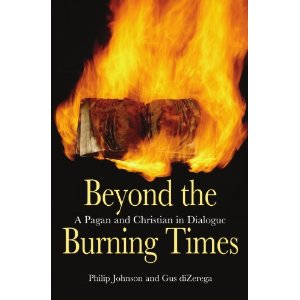
In this intriguing dialogue, an established pagan and a respected Christian theologian engage in open, honest conversations about human spirituality and belief. Paganism is a rapidly expanding belief system, and this helpful exchange both introduces novices to its basic tenets and compares them to the beliefs and ideals behind Christianity. Such topics as the nature of spirituality, who or what is deity, how humans relate to the divine, the sacred feminine, gender, and sexuality are all addressed, along with specific debates involving the teachings and claims of Jesus. Offering a fair assessment and valuable insights into both faith systems, this is an engaging look at the state of belief in the modern world.
“I think I can whole-heartedly state that this is the best book of its kind (so far), and should be read by as many Pagans and Christians as possible. It represents a quantum leap forward in Pagan-Christian relations.
I’m very pleased that Gus diZerega was chosen to represent a Pagan perspective and treated as an equal. His history of interfaith work, and deep understanding of Pagan theologies, makes him a perfect representative. Obviously, as a Pagan, I agree far more often with Gus than I do with Philip, but that is to be expected. I appreciated Philip Johnson’s calm and even-handed responses to Gus, and his love-centered view of the gospels. There were a few instances where each”talked past” the other, but I suspect that is a normal hazard of such dialogs.
If you are a Pagan with Christian relatives, this is a great “first book” to give them. Likewise, if you are a Christian trying to understand a Pagan friend or relative I would urge you to turn to “Beyond the Burning Times” before heading to some of the more sensationalistic Christian-penned works.”
Jason Pitzi-Waters
“. . . a very useful, timely, intelligent and compassionate dialogue.”
Christopher Partridge, Lancaster University, UK
Persuasion, Power and Polity
A Theory of Democratic Self-Organization
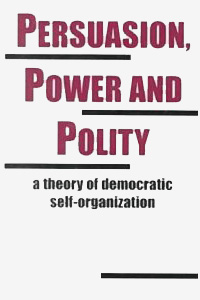
Democratic theory extends at least as far back as Aristotle and came into its own after the American Revolution. Yet despite this antiquity, it’s has been hamstrung by being viewed through the lenses crafted for studying undemocratic states. Yet states are organizations whereby some people dominate others whereas democracies are means by which a political community seeks to be self-governing. A careful reading of Aristotle and the leading thinkers of the American Revolution makes the importance of this distinction clear, and with it, the inadequacy of most theoretical writing on the subject.
F. A. Hayek and Michael Polanyi’s concept of “spontaneous order” offers a far better framework for understanding modern democracy than do traditional state centered models. DiZerega demonstrates how once this distinction is grasped, age old issues in the study of democracies take on a new and more comprehensible look and crucial ways in which democracies differ from other governments take on renewed importance. In addition, this framework opens new vistas as to how reforms within democratic polities might resolve some of the most long standing problems in democratic practice.
“The is political philosophy as it should be but rarely is.”
Nelson Polsby, Director, Institute of Governmental Studies, UC Berkeley
“Original. Rewarding. Accessible. . . . The book is a stunning application of the ideas of Hume, Michael Polanyi, and Hayek to democratic theory. It is first rate and persuasive.”
William K. Muir, Jr. UC Berkeley
“diZerega is one of the most original and interesting of the new generation of political theorists.”
Charles Anderson, University of Wisconsin
“Not only is diZerega’s case well argued at the theoretical level, but he also provides a detailed account of the kind of noncoercive institutions that are needed to revitalize democratic practices on a human scale. . . . Truly a formidable achievement.”
Laurent Dobuzinskis, Simon Fraser University, Canada
Pagans & Christians
The Personal Spiritual Experience
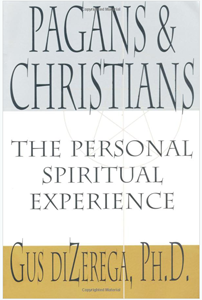
Winner of the 2001 Coalition of Visionary Resources (COVR) Award for Best Non-fiction Book
Although Christianity is still a major religious force, there are growing numbers of people in other faiths, including the various Pagan traditions. Some Christians have responded to this trend with fear and derision, while some Pagans have reacted to that fear with anger and mistrust.
Much of the problem is due to misunderstandings and lack of communication. This can change with Gus diZerega’s Pagans & Christians. Here you will find a penetrating and illuminating comparison, showing that neither path has the single correct approach to the Divine. Rather, either or both can be authentic and legitimate expressions of the appreciation of the Ultimate Source of All.
Pagans & Christians is an ideal way to help bridge what at time seems a wide chasm between Christian and Pagan beliefs. By sharing core ideas of both paths, this book provides a way to give deeper mutual understanding and unity among the religions of the world.
Although Pagans & Christians accepts both paths as valid, the book provides a more in-depth explanation of Paganism ó the minority religion because in some ways, Paganism demands a greater defense and explanation of its beliefs and ideas to dispel misunderstandings. The author is a Third Degree Gardenerian Elder and in Pagans & Christians has presented nothing less than a brilliant defense of Paganism, clearly showing how it should stand beside all of the major religions of the world as an equal. As part of this defense, diZerega gives a listing of biblical contradictions and Christian philosophical difficulties which can help any Pagan responding to a negative attack, and will help any Christian to view his or her religion as a way, not the way.
“With erudite wisdom and penetrating insight, Gus diZerega has pierced through the veil of common rhetoric to question and examine the deepest core of spiritual experience.”
Anodea Judith
“This wonderful book is a rich dialogue between the Pagan and the Christian approaches to the Sacred, pointing out, quite rightly I believe, that neither has the single correct approach to the Divine, but that both can be, and are, legitimate expressions of the ever-present Spirit which is the fountain of all genuine devotion, release, harmony, and fulfillment. . . . this book is highly recommended for all spiritual seekers. . . “
Ken Wilber

Hello! Will the book, “God is Dead: Long Live the Gods” become available in e-book form again? I noticed that it was no longer in the Kindle store. Thanks!
I wish! After spending zero effort at marketing, Llewellyn has declared it out of print. Books on Pagans and Werewolves seem more their current speed. I can send you a new hard copy of the book for a fraction of the list price, or you can see whether a cheap copy, or maybe a e-book copy, can be obtained from a site like Allibris.com. And thank you for your interest!
Hello Gus
I would love to purchase a hard copy of the book “God is dead: Long Live the Gods”. I love, love, love trees but I also love holding and smelling (yes, the smell of a good book is all part of the reading experience). Please let me know what I need to do.
Thank you for your interest,Kathleen. I often buy books online at https://bookshop.org/ because they send some of the income to local bookshops. Alternatively you can get used books, sometimes new, at https://www.alibris.com/. They are my source for used books.
I hope you enjoy it!
Gus